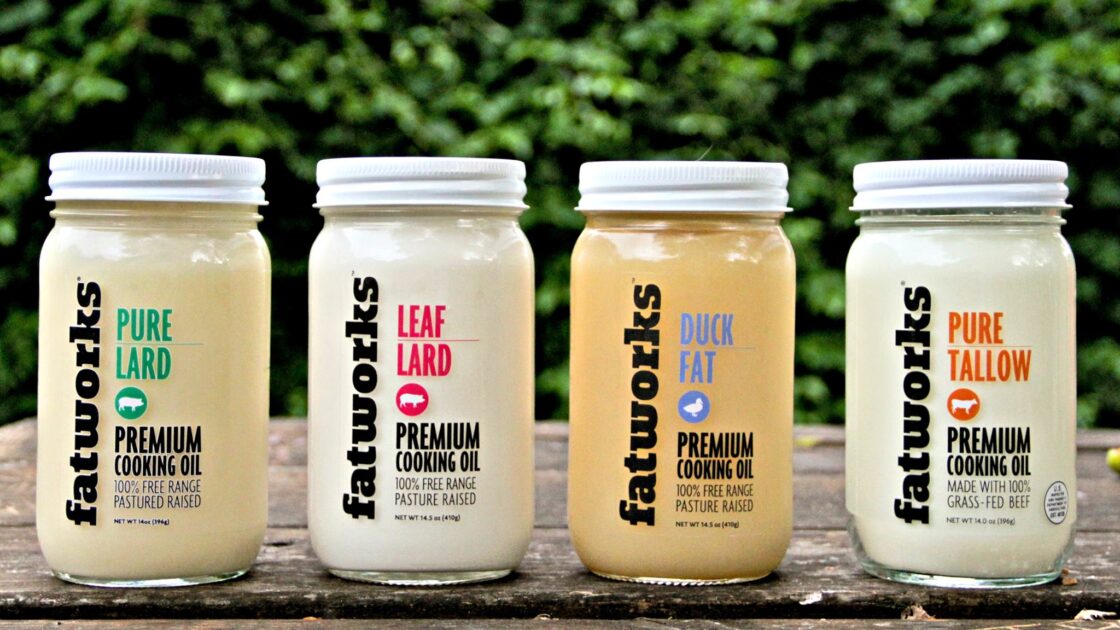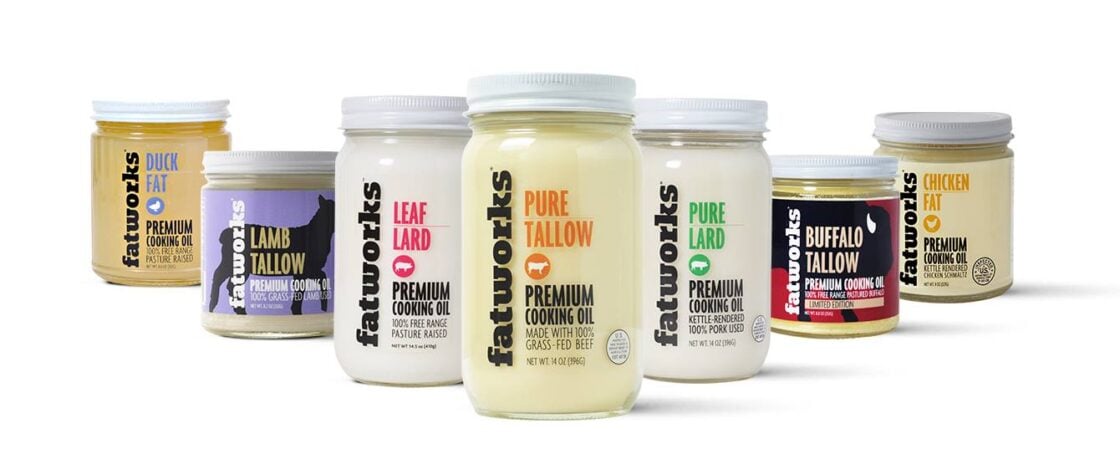Fatworks is Making Leaf Lard (and Other Animal Fats) Cool Again

It’s not easy to keep up with health trends: sugar, carbs, and especially fat have all been through the ringer. Chances are, your great-grandma’s pie crust was made with leaf lard, your grandma made it with margarine, and your mom probably tried to make it with “heart healthy” olive oil.
But experts confirm that lard is back in a real way, provided it’s of the highest quality – and that’s where Colorado-based Fatworks comes in. This company uses minimal processing and top-quality ingredients to create natural, animal-based fats for all your cooking needs.
Fatty Firsts
The resurgence of traditional rendered animal fats like leaf lard, beef tallow, and schmaltz can in large part be attributed to the popularity of paleo and primal diets, which shy away from unsaturated fats that were once considered healthier in favor of saturated fats like coconut oil and ghee. When Fatworks founder David Cole first discovered this diet seven years ago, however, he was disappointed to find that there were few places to source truly high-quality animal fats.
“At the time, we just started eating coconut oil with everything,” he says. “We got kind of sick of that, and we started looking for alternatives, and we couldn’t really find any that were up to our standards.”
So he decided to change that. Starting with just one kettle and a bit of beef fat, the company began producing its first beef tallow. Paleo bloggers got wind of what they were doing, fell in love with it, and from there, the company hasn’t stopped growing.
The Science of Fat
Lard and butter have long been linked to heart disease, so let’s set the record straight: it turns out we were wrong to condemn animal fats – at least if they’re of good quality.
A 2016 study performed by researchers at the KG Jebsen center for diabetes research at the University of Bergen challenged the preconceived notions surrounding saturated animal fats, with contributing author professor and cardiologist Ottar Nygård noting that a “very high intake of total and saturated fat did not increase the calculated risk of cardiovascular diseases” in study participants, and that those who consumed a high-fat diet saw “substantial improvements in several important cardiometabolic risk factors, such as ectopic fat storage, blood pressure, blood lipids (triglycerides), insulin and blood sugar.”
The results of this study found that it wasn’t the amount of fat being consumed, but rather the quality of the fat – and the other foods – in the diet that mattered. Minimally-processed, high-quality fat sources were key to improving health and increasing good cholesterol.
Other experts around the world agree, from researchers at Harvard Medical Center to the University of Ireland: saturated fat isn’t the foe we feared – far from it.
Fatworks Focuses on Quality Fat
Cole knew that the key to an excellent product was starting with excellent ingredients, so he went straight to the source: small family farmers who pasture-raise their animals and use non-GMO feed (and are willing to sign an affidavit to prove it).
“I made a list of all the pasture-raised small family farms in the country,” says Cole. “And then we just started emailing them and calling them.”
It turned out that the offer to buy excess fat was more than appealing to most of them. Fat’s bad rep meant that most farmers had a surplus, which they either tried to sell raw or occasionally render themselves at home.
“Sometimes they were just throwing it out,” says Cole. “We’re glad that we could help stop that. Fat is a terrible thing to waste.”
Each of the small farmers working with Fatworks stockpiles fat on-site, vacuum-sealing it and freezing it until they have enough to send to HQ. There, it is rendered in small 60 or 80 gallon kettles. No preservatives are added, except, in some cases, a small amount of organic rosemary – a natural antiperoxide.
From there, the fat is filtered, something that Cole takes quite seriously. The goal is a pure, limpid product: a fat filtered so refined that consumers wouldn’t see any residue through the glass container. But of course, Cole also wanted to make sure that this was done as naturally as possible.
“There are some bigger companies that are bleaching their lards and then running them through these centrifuge machines,” he says. “They can get theirs really clean, but theirs is a highly processed hydrogenated fat. Our goal is to make a clean, natural fat.”
Once the fat is filtered, each of the jars is hand-filled, labeled, and shipped off to be sold.

A Fat For Everyone
From its very first batch of beef tallow, Fatworks has expanded its line to include eleven different animal fats, ranging from duck fat to leaf lard to buffalo tallow.
“We’ve added a wild boar, which is crazy,” says Cole, noting that the boar are captured wild in Texas and have never seen a day on a farm.
“Their antioxidant profiles are totally different,” says Cole. “The omega-3s are just through the roof as compared to even just the pasture-raised lard that we make.”
In fact, each fat has its own distinct nutrient profile – the ruminant fats, for example, tend to have more CLA – and each can be used in a variety of ways: leaf lard, with its milder flavor, is great for making flaky pie crusts; robustly flavored tallow is excellent for sautéing and frying, and chicken fat can be used in place of vegetable oil to make paleo salad dressings.
“We call the chicken fat our ‘gateway fat,’ because it almost has the viscosity of an olive oil,” explains Cole. “So if you were not used to tallow, which is just really saturated fat, then chicken fat’s a great way to get your feet wet.”
And others agree. Last year, Fatworks’ organic chicken fat placed as a finalist for Outstanding New Product in the Specialty Food Association sofi Award competition.
“People will ask us which is the best? And that’s sort of like asking which is the best vegetable,” says Cole. “You kind of want to eat a spectrum of foods, and I think it’s the same with fats.”
Chatting Up Fat
Fat has a lot of bad press to make up for, but Fatworks is nothing if not proactive for the cause. Cole dubs his team “The Fattitude Adjusters,” and through the company’s quality products, he hopes to influence people’s opinion of formerly maligned animal fats for the better.
“Our mission was not only to create this company, but to rebrand the whole idea of fat as a high-quality, important nutrient,” says Cole. “So that’s what we’ve been doing.”
Related on Organic Authority
How to Make Dinner for Vegetarian and Paleo Diets (Without a Fuss)
30 Days of Paleo: My Clean Eating Adventure Begins
Here’s the Skinny on the Ketogenic (High-Fat) Diet

